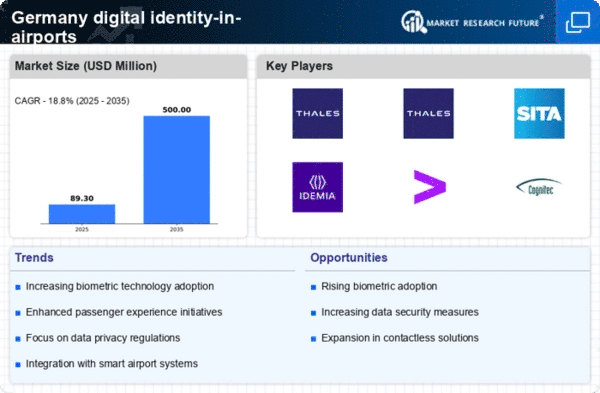Rising Investment in Airport Infrastructure
Rising investment in airport infrastructure in Germany is a significant driver for the digital identity-in-airports market. As airports undergo modernization and expansion projects, there is a growing emphasis on integrating advanced technologies, including digital identity solutions. Investments in infrastructure are often accompanied by the need for enhanced security and efficiency, which digital identity systems can provide. According to industry reports, airport infrastructure spending in Germany is projected to reach €5 billion by 2027, with a substantial portion allocated to digital transformation initiatives. This influx of capital is likely to facilitate the adoption of innovative identity verification technologies, thereby propelling the growth of the digital identity-in-airports market. The synergy between infrastructure development and digital identity solutions presents a promising landscape for future advancements.
Growing Demand for Seamless Travel Experiences
The digital identity-in-airports market is witnessing a growing demand for seamless travel experiences among passengers in Germany. Travelers increasingly seek efficient and hassle-free processes, which digital identity solutions can provide. The integration of biometric technologies, such as facial recognition and fingerprint scanning, facilitates quicker check-ins and boarding procedures. According to recent data, approximately 70% of travelers express a preference for automated processes that reduce wait times. This trend indicates a shift towards a more streamlined travel experience, which is likely to drive the adoption of digital identity solutions in airports across Germany. As airports strive to enhance customer satisfaction, the digital identity-in-airports market is expected to expand significantly, catering to the evolving needs of modern travelers.
Increased Focus on Passenger Safety and Security
Passenger safety and security remain paramount concerns for airports in Germany, driving the digital identity-in-airports market. In light of rising security threats, airports are prioritizing the implementation of robust identity verification systems to ensure the safety of travelers. Digital identity solutions, particularly those utilizing biometric technologies, offer enhanced security measures that can effectively mitigate risks. Recent surveys indicate that over 80% of passengers are more likely to choose airports that employ advanced security technologies. This heightened focus on safety is likely to propel the adoption of digital identity solutions, as airports seek to reassure travelers and comply with stringent security regulations. As a result, the digital identity-in-airports market is expected to thrive in response to these pressing safety concerns.
Regulatory Support for Digital Identity Initiatives
In Germany, regulatory support for digital identity initiatives is emerging as a crucial driver for the digital identity-in-airports market. The government has been actively promoting digitalization across various sectors, including transportation. Recent policies encourage the implementation of secure digital identity verification systems to enhance security and efficiency in airports. This regulatory framework not only fosters innovation but also instills confidence among stakeholders in adopting digital identity solutions. With the backing of governmental initiatives, the digital identity-in-airports market is likely to experience accelerated growth, as airports align their operations with national digitalization goals. The potential for funding and support from public entities further enhances the attractiveness of investing in digital identity technologies.
Technological Advancements in Identity Verification
Technological advancements in identity verification are significantly influencing the digital identity-in-airports market in Germany. Innovations in artificial intelligence and machine learning are enhancing the accuracy and speed of identity verification processes. For instance, advanced algorithms can analyze biometric data in real-time, reducing the likelihood of errors and improving security measures. As airports increasingly adopt these technologies, the market is projected to grow at a compound annual growth rate (CAGR) of around 15% over the next five years. This growth is driven by the need for more efficient and secure identity verification methods, which are essential for maintaining safety in airport operations. Consequently, the digital identity-in-airports market is poised for substantial expansion as technological capabilities continue to evolve.





















Leave a Comment